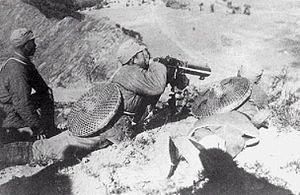Battle of Pingxingguan
| date | 24. - 25. September 1937 |
|---|---|
| place | Pingxingguan , Shanxi , China |
| output | Chinese tactical victory |
| Parties to the conflict | |
|---|---|
| Commander | |
| Troop strength | |
| about 6,000 soldiers | about 10,000 soldiers |
| losses | |
|
500 dead |
1,000 dead / prisoners |
1937–1939
Marco Polo Bridge - Beijing-Tianjin - Chahar - Shanghai ( Sihang warehouse ) - Beijing-Hankou Railway - Tianjin-Pukou Railway - Taiyuan ( Pingxingguan , Xinkou ) - Nanjing - Xuzhou ( Tai'erzhuang ) - Henan - Lanfeng - Amoy - Wuhan ( Wanjialing ) - Canton - Hainan - Nanchang - ( Xiushui ) - Chongqing - Suixian-Zaoyang - ( Shantou ) - Changsha (1939) - South Guangxi - ( Kunlun Pass ) - Winter Offensive - ( Wuyuan )
1940–1942
Zaoyang-Yichang - Hundred Regiments - Central Hubei - South Henan - West Hebei - Shanggao - Shanxi - Changsha (1941) - Changsha (1942) - Yunnan-Burma Road - Zhejiang-Jiangxi - Sichuan
1943–1945
West Hubei - North Burma and West Yunnan - Changde - Ichi-gō - Henan - Changsha (1944) - Guilin – Liuzhou - West Henan and North Hubei - West Hunan - Guangxi (1945) - Manchukuo (1945)
The Battle of Pingxingguan took place from September 24 to 25, 1937 during the Second Sino-Japanese War in the course of the major Battle of Taiyuan between the 8th Red Army of the Communist Party of China and the Japanese Army . Since the Chinese achieved a small but important moral victory over the Japanese here , the battle is known there to this day as "The Great Victory of Pingxingguan" ( Chinese : 平型关 大捷).
background
After the capture of Beijing at the end of July 1937 (→ Battle of Beijing-Tianjin ), the Japanese troops advanced along the Beijing – Suiyuan railway towards Inner Mongolia . After being informed of this, Chiang Kai-shek appointed the warlord Yan Xishan as pacification commissioner of Taiyuan . In theory, Yan was in command of all Chinese military units in his area, Shanxi Province . In addition to regular Kuomintang troops, these included the 115th Division of the Communist 8th Red Army under Lin Biao and former Kuomintang units under Liu Ruming . In fact, all of these forces operated independently of Yan's provincial army.
Japanese forces, mainly the 5th Division and the 11th Independent Mixed Brigade , moved from Beijing to Huaili in Chahar . A column quickly advanced into Shanxi using the railway line that was not destroyed by the Chinese. The Chinese left Datong on September 13 and withdrew to a line from Yanmenguan on the Great Wall east of the Pingxingguan Pass . Yan Xishan's troops' morale quickly plummeted as the Japanese began to exploit their air superiority.
The main forces of the Japanese 5th Division under the command of Lieutenant General Itagaki Seishirō advanced further northeast of Huaili to take Shanxi. Since they were traveling with a motorized column, the marching speed was limited due to the poor road conditions. When they reached the border to Shanxi, the Chinese forces of the 115th Division were already on site after a forced march through the province of Shaanxi to attack the unsuspecting Japanese.
Course of the battle
The Pingxingguan Pass was a narrow gorge that offered no exit for several kilometers, except for the road itself. After their long march through relatively easy to defend terrain, the Japanese had become reckless and inattentive and began their way through the pass without the to explore or secure right and left flanks on the heights. The approximately 9,000 Chinese soldiers under Lin Biao formed a considerable attack force, and they were armed with enough rifles and machine guns .
On the morning of September 25th, the Chinese attacked the front rows of the Japanese marching in a long column, and around noon the center and the rear guard. The Chinese essentially threw hand grenades at the Japanese and fired into the unprotected ranks. The heavily laden Japanese were trapped about 5 meters below their attackers. The tanks they carried proved to be completely unsuitable for defense in the narrow gorge, while the Chinese attacked the Japanese along the full length of the column.
When the battle was over, around 1,000 Japanese were killed or captured. The Chinese lost around 500 people. Around 100 trucks with supplies, including many weapons, ammunition and clothing, fell into the hands of the Chinese. The Japanese 5th Division was temporarily disabled as an operational force.
Historical evaluation
The official Kuomintang historiography describes the battle in one sentence without appreciating the involvement of the communists. On the other hand, communist sources value the battle in the Pingxingguan Pass as a typical "red guerrilla tactic", which was inspired by Mao Zedong's conceptual idea of people's war . Like the defeat in the later battle for Tai'erzhuang , the Japanese explained the defeat with the word victory fatigue . After a long series of victories over the Chinese, they culpably neglected the most basic precautionary measures. These grave mistakes were not to be repeated by the Japanese as the war progressed.
The victory in Pingxingguan Pass ultimately gave the Chinese a tremendous moral boost and the Chinese people's belief in the fighting strength of the communist army.
Web links
- Mao Tsetung: The Art of War, The Battle of Pinghshingkuan Pass (English)
- Pingxingguan battle (English; PDF file; 372 kB)
- 抗战 烽火 : 平型关 大捷 Maps and photos of the battle (Chinese)
